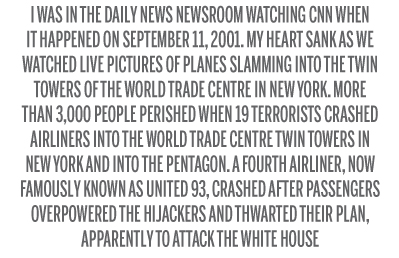
Terrorism takes many forms, but at its core, the goal is nearly always the same. Terrorism subverts our liberties, our values and our way of life. We in Sri Lanka have experienced the worst atrocities that can be committed by terrorists in the name of ‘liberation’. Terrorists often claim to be fighting for freedom, but that is the very thing they take away through their sheer barbarism.
 What exactly is terrorism? There is no single accepted definition of terrorism. There are more than 100 definitions of the word, the first use of which was recorded in 1795 in The Times (UK). The US Federal Bureau of Investigations (FBI) defines terrorism as “the unlawful use of force or violence against persons or property to intimidate or coerce a Government, the civilian population, or any segment thereof, in furtherance of political or social objectives”.
What exactly is terrorism? There is no single accepted definition of terrorism. There are more than 100 definitions of the word, the first use of which was recorded in 1795 in The Times (UK). The US Federal Bureau of Investigations (FBI) defines terrorism as “the unlawful use of force or violence against persons or property to intimidate or coerce a Government, the civilian population, or any segment thereof, in furtherance of political or social objectives”.
As the reference to 1795 shows, terrorism is not altogether a new phenomenon. But the world lacked a collective will to fight terrorism in all its manifestations until 20 years ago, when, in one defining moment, it became clear that it must be fought firmly and decisively. That moment is forever etched in history – and our minds.
I was in the Daily News newsroom watching CNN when it happened on September 11, 2001. My heart sank as we watched live pictures of planes slamming into the Twin Towers of the World Trade Centre in New York. More than 3,000 people perished when 19 terrorists crashed airliners into the World Trade Centre Twin Towers in New York and into the Pentagon. A fourth airliner, now famously known as United 93, crashed after passengers overpowered the hijackers and thwarted their plan, apparently to attack the White House.
 That remains the single biggest act of terrorism on US soil and even worldwide, it is one of the biggest attacks ever. It spurred a chain of events, some good, some bad, but the overall effect was a heightened awareness that terrorism everywhere should be crushed.
That remains the single biggest act of terrorism on US soil and even worldwide, it is one of the biggest attacks ever. It spurred a chain of events, some good, some bad, but the overall effect was a heightened awareness that terrorism everywhere should be crushed.
Hateful ideologies
But almost 21 years after 9/11, acts of terrorism propagating a wide-range of hateful ideologies continue to injure, harm and kill thousands of innocent people each year. And terrorism does not even have to be physical – there is cyber-terrorism and psychological terrorism as well, where terror groups induce a fear-psychosis among the population without necessarily resorting to physical violence.
Despite global terrorist attacks increasing to 5,226 in 2021, deaths declined slightly by 1.2 percent to 7,142 (2022 Global Terrorism Index). Terrorism in the West declined substantially, with attacks falling by 68 percent. The US recorded its lowest score since 2012. Sub-Saharan Africa accounted for 48 percent of global terrorism deaths.
The Sahel is home to the world’s fastest growing and most-deadly terrorist groups. The Islamic State (IS) replaces the Taliban as the world’s deadliest terror group in 2021, with 15 deaths per attack in Niger. Terrorism has also become more concentrated, with 119 countries recording no deaths, the best result since 2007. Terrorists are using more advanced technologies including drones, GPS systems and encrypted messaging services.
Despite international condemnation of terrorism, victims often struggle to have their voices heard, their needs supported and their rights upheld. Victims often feel forgotten and neglected once the immediate aftermath of a terrorist attack fades, with profound consequences for them. Few UN Member States have the resources or the capacity to fulfill the medium and long-term needs of victims to enable them to fully recover, rehabilitate and re-integrate into society. Most victims can only recover and cope with their trauma through long-term multi-dimensional support, including physical, psychological, social and financial.
Supporting the victims and survivors
In its resolution 72/165 (2017), the General Assembly, established the International Day of Remembrance of and Tribute to the Victims of Terrorism to be commemorated annually on August 21 (today), to honour and support the victims and survivors of terrorism and to promote and protect the full enjoyment of their human rights and fundamental freedoms
In April 2020, mandated by GA resolution 73/305, the United Nations Secretary-General António Guterres published his report on the ‘Progress of the UN system to support Member States in assisting victims of terrorism’ (A/74/790), which calls for the ‘enhancement of international cooperation to assist victims of terrorism’.
The resolution further welcomes the first Global Congress of Victims of Terrorism, which will be held in September 2022 at UN Headquarters, and encourages the UN Office of Counter-Terrorism, through the Global Victims of Terrorism Support Programme and the United Nations Victims of Terrorism Support Portal, to continue to raise awareness on victims of terrorism and the promotion and protection of their rights. This includes further strengthening the capacity of, and providing technical assistance to, Member States to assist victims of terrorism and strengthen their engagement with relevant civil society and private sector organisations, which can play a valuable role in assisting and supporting victims of terrorism.
Incidentally, most terror groups misuse ethnic or religious beliefs to further their cause, denying these very freedoms in the process. Freedom of religion or belief, freedom of opinion and expression, the right to peaceful assembly and the right to freedom of association are interdependent, interrelated and mutually reinforcing. They are enshrined in articles 18, 19 and 20 of the Universal Declaration of Human Rights. Upholding these rights plays an important role in the fight against all forms of intolerance and of discrimination based on religion or belief.
Positive role
The open, constructive and respectful debate of ideas, as well as interreligious, interfaith and intercultural dialogue can play a positive role in combating religious hatred, incitement and violence. There are continuing acts of intolerance and violence based on religion or belief against individuals, including against persons belonging to religious communities and religious minorities around the world, and the number and intensity of such incidents, which are often of a criminal nature and may have international characteristics, are increasing.
That is why the UN General Assembly has declared the “International Day Commemorating the Victims of Acts of Violence Based on Religion or Belief” which falls on August 22 (tomorrow), strongly condemning continuing violence and acts of terrorism targeting individuals, including persons belonging to religious minorities, on the basis of or in the name of religion or belief.
The Member States including Sri Lanka have reaffirmed their unequivocal condemnation of all acts, methods and practices of terrorism and violent extremism conducive to terrorism, in all its forms and manifestations, wherever and by whomsoever committed, regardless of their motivation, and reiterated that terrorism and violent extremism as and when conducive to terrorism, in all its forms and manifestations, cannot and should not be associated with any religion, nationality, civilization or ethnic group. We must all aim for a world free of hatred.
